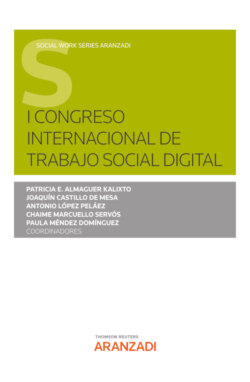Читать книгу I Congreso Internacional de trabajo social digital - Paula Méndez Domínguez - Страница 11
На сайте Литреса книга снята с продажи.
COMMUNICATION 1.5. SOURCES OF RESILIENCE. SOCIAL WORK AND DIGITAL ACTIVISM: SORORITY, INTERSECTIONALITY, HOMOPHILY AND POLARIZATION AT #METOO; #NIUMAMENOS; #NIUNAMAS; #8M
ОглавлениеAUTHORS
• Joaquín Castillo de Mesa, Universidad de Málaga
• Paula Méndez Domínguez, Universidad de Málaga
• Antonio López Peláez, UNED
• Chaime Marcuello Servós, Universidad de Zaragoza
SUMMARY AND OBJECTIVES
A commitment to promoting social justice lies at the heart of the social work profession (Grant & Austin, 2014). Some define social justice in terms of oppressor and oppressed language, and others underscore the centrality of promoting human rights, multiculturalism, and diversity (Austin, Branom, & King, 2014). The National Association of Social Workes [NASW] (2018) and the International Federation of Social Workers [IFSW] (2016) identifies the promotion of social justice as a primary social worker role. The emancipatory approach of Social Work considers activism as a tool to fight for better social justice. Research suggests that activists have often used social networking sites as tools of resistance to claim social justice and shift the balance of power and functioning (Veil, Reno, Freihaut, & Oldham, 2015). There is participation in the production and reproduction of digital content, in a process of mass self-communication that challenges conventional structures and promotes the empowerment of those who do (Hoffman, Lutz, & Meckel, 2015).
Social Work faces the challenge of dealing with social networking sites. These sites have become a parallel universe of socialization where digital activism is taking place. The #Metoo movement is a global reference and it is being consolidated as a digital global feminist movement against harassment and women abuse.
In this paper, we analyse different hashtags (#Metoo; #Niunamenos; #Niunamas #8M) related to feminism on Twitter between 2018-2019 from a social work perspective in a longitudinal way by social network analysis and netnography in conjunction with certain algorithms.
The results achieved show how every hashtag has a different feminist orientation. #Metoo is used to denunciate harassment and abuse, #niunamas and #niunamenos are used to denunciate report femicides and violence while #8M is used to claim women rights. The insights demonstrate significant patterns of sorority, homophily and affective polarization through the identified echo chambers and bubble filters in the Twitter communities detected. Moreover, these online communities mirror characteristics from the offline reality (geographical location, affinities, similarities). The global effect and durability of the #Metoo movement raises a new perspective of social movements in a digital era.
Social workers must tackle the growing homophily and polarization on social networking sites, promoting digital contents oriented to tolerance to diversity. Practitioners need to be awareness and intervene on global digital spaces from in a proactive way to understand, reflect and act in favour of social justice, the equality of rights and the empowerment of disadvantaged, vulnerable and oppressed people.
URL: https://youtu.be/Fv3SdRCz-XM
